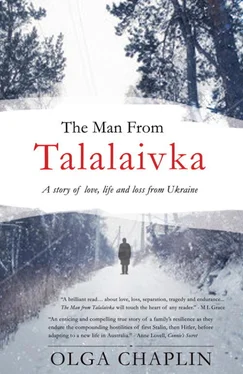“These officers want you to tell them if you know these men,” the captain pressed him. Peter still could not be certain what would happen to him, but truthfulness was all he could offer. Evdokia and their children’s lives depended on this.
Even before he recognised the jacket, with its distinctive trim so proudly worn as a reward from none other than Kaganovich, Peter knew it was Dimitri, alongside Hresha, his superior. He bowed his head, in instinctive respect for the fallen, then nodding, spoke in answer to the SS men’s questioning. He realised with leaden heart that, although these men were agents of Stalin’s regime, they were still his countrymen, attempting to escape from the invaders. Even with all the help from Stalin’s intelligence officers, they could not have calculated how swiftly the pincer units from Konotop would meet these southern townships. They had jumped from one SS search into the path of the other.
Peter could not hold his nerve any longer—he turned away from the SS men, closing his eyes, waiting for the worst, voices murmuring in their foreign language fogging his senses. When he looked again, the SS men were gone. The captain, standing legs astride and hands on hips, was calculating his next move.
He nodded at Peter and continued back to his panzer truck. Peter could not move, uncertain what was planned for him.
The interpreter touched his arm. “You will come back with us to Talalaivka, after Konotop. It may be our headquarters for this area.”
His stomach still so tight he thought he would be ill with the tension, Peter swallowed hard, again and again, trying to focus on all his past training, on his profession, and slowly made his way back to the panzer truck. The captain was keeping him on. He had not yet outlived his usefulness to the new regime.

Chapter 22
The captain scoured the landscape below his vantage point, his shoulders granite-hard, and focussed his binoculars again on the thunderous explosions. Peter, crouching behind the partly destroyed wall with the surviving soldiers to one side of the captain’s makeshift bunker, felt the earth shudder, vibrating through him, and waited for the whistling sounds of panzer rocket fire as they shrieked through the blackened air. He crouched lower, almost in foetal position in the hollow, his arms protecting his head as fragments of debris and volcanic-like dust blew over them. He breathed into his jacket. He dared not cough, the dust particles so fine and insidiously acrid that they choked the unsuspecting soldiers, disabling them. Hobbled in his bent position, he could feel the bulky food packet in his jacket pocket, untouched since morning, his stomach tightened for battle.
Another short lull, then more explosions, panzer-tank rocket fire and crackling sounds of burning timber amid the ruins. At last, he peered between the fallen rocks of his crumbled parapet. The captain, protected by an armoured steel panel, binoculars glued to the carnage of Konotop junction, stood proud at his bunker, a slow smile breaking his dust-hardened face. “Ah! Gute! Gute!” he cried as he pushed back his helmet and wiped his face, his fair hair streaked grey with dirt and perspiration, belying his youthfulness, his appearance matching the intensity of the war’s experience.
Peter followed the captain’s gaze to the battleground. He sensed they had reached a critical point in the fighting. He turned to the interpreter, who was still huddled beside him, unable to move, the trauma of the bombs’ near misses impacting on him, his earlier soldierly confidence gone, revealing a tormented youth’s face. Peter took the gamble, edged his way out from the rubble to view the scene. He could now hear the rumbling victorious tanks as they appeared through the smoking haze, and watched as they rolled into ordered positions. Finally, a protected motorcade circled in, unexpectedly, from the north-west of the pivotal junction.
“So this was the captain’s deadline…” he whispered. “His men had to position themselves, give this panzer army the lie of the land here, at Konotop, before their onslaught!” He shook his head as he speculated on the audacity and speed of such a campaign, thousands of kilometres from Hitler’s heartland. The surprise element of these panzergruppe armies caught out even the most dedicated Soviet forces, to their cost.
The captain waved his men on, to clear the junction, save whatever stock they could. The interpreter pulled at Peter’s sleeve: he, too, was required to mop up. Even without his veterinary supplies, he could still check, and indicate, which livestock could be saved. His stomach tightening again, mind numbed by the resounding blasts, he prepared himself for the slaughter before them. There would be few, if any, prisoners left in the wake of this ambitious General Guderian’s daring attack. His successes were legendary in the German Reich, even before his panzergruppe army began its diversionary south-westward hammer-swing from Russia’s Smolensk back into the Ukraine, on Hitler’s insistence, towards the final battle of Kiev.
* * *
“Hurry! Hurry! The commandant has arrived! We must hand-over now, and you must be explained!” The interpreter’s message rang out through the office, his eyes flashing with excitement as he ran back to the courtyard. Peter nodded to Andreye, his assistant, and clasped his shoulder as they headed for the line-up. The Talalaivka office and soldiers’ quarters had a peculiar normality about it, removed from the battles in the east and south. Miraculously his junior had, like him, survived the German invasion and demands of these past weeks.
It was final, then. The German armies had pushed Stalin’s forces back to Russia’s border, had crushed the Soviet armies at Kiev, boasting its record capture of Soviet soldiers, and were poised, now, awaiting Hitler’s changing orders, for their attack on Moscow from the safety of their secured territory of the Ukraine and Belorussia. Like a chessboard game in which only the dominant player knows the rules with its life-and-death consequences, the German army systematically manoeuvred itself as it installed its commandant in each conquered area, while Hitler’s adversary, Stalin, remained almost mute, bunkered in the Kremlin, even as he prepared his government’s retreat eastward to Kuybyshev. The chessboard game was over, in mid-game. The Ukrainian people and lands would remain in the German army’s control.
Peter bit his lip, as he waited with the soldiers. Despite all the grotesque fighting, the sacrifice of life from all sides, Stalin’s ‘scorched earth’ policy had almost certainly pre-determined the fate of the Ukraine and its people. Now, once the commandant and his ruthless army unit were ensconced to administer this area, they were under the rule of their new master, Hitler. Peter shook his head, the irony looming before him. His countrymen and women would henceforth—for how long he knew not—be forced to produce the agriculture and industrial goods, in ever-increasing quantities: those very goods and utilities that Hitler’s armies would ultimately use against Russia and other peoples. His countrymen had changed one master for another; their new master, Hitler, just as obsessed with his domination of the Ukraine as the seemingly conquered Stalin.
He stood at attention, at the incongruously formal hand-over, his shoulders taut, still proud beneath his dusty jacket.
“Please God… at least let them permit visits to our families sometime,” he prayed in silence. Weeks had passed, with no contact, no word from their kolkhoz village. There was no knowing how Evdokia and the children were faring or if they were still safe. He closed his eyes for a moment. Flashes of his enforced duties in the mop up of Konotop were still so raw and unsettling, reminding him of war’s horrors. All were victims, ultimately. Whatever was to come, and for however long they would be under the subjugation of Hitler’s regime, perhaps, with relative stability, lives would be spared and not wasted in unwinnable battles.
Читать дальше













